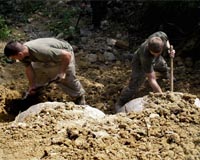| . |  |
. |
Washington (UPI) May 22, 2009 Delaying the completion of the Radford Army Ammunition Plant modernization program is a major mistake. Delay is costly in many ways. Most obviously, something could go wrong with the aging infrastructure at the Radford Army Ammunition Plant in Virginia. In addition, the U.S. Army is taking a risk waiting for the new management contract to be awarded. The contracting process is often lengthier than anticipated, which would delay both the awarding of the management contract and the investment of the modernization funds. Also, given downward pressure on the defense budget, the money may not be there in a year. At the Lake City Army Ammunition Plant, the U.S. Army decided that delaying modernization to await a new management contract would be a mistake. Indeed, the U.S. Army extended the current contract until the modernization effort was completed. Overall, the U.S. Army has successfully managed its effort to modernize the ammunition industrial base of the United States. It should finish the process it began after the al-Qaida terrorist attacks of Sept. 11, 2001. With respect to that most critical of links in the chain of facilities producing ammunition for U.S. war fighters, the Radford Army Ammunition Plant in Virginia, the U.S. Army should take the following steps: -- Commit available funds now. Waiting not only increases risk, but the cost of the Radford Army Ammunition Plant's products. In effect, the U.S. Army should decouple the two efforts, the basic management of the Radford Army Ammunition Plant and that facility's modernization. -- Consider options for managing modernization while planning a re-compete. The U.S. Army should consider repeating the decision it took with respect to modernization at the Lake City Army Ammunition Plant. The approach described above has several features to recommend it. First, it ensures that the money will be spent as intended, rather than being diverted to other uses. Second, by spending the modernization money now, the process is accomplished in an expeditious fashion. Third, this will make the re-compete easier; the contract will be more attractive to bidders if they know that the facility they will manage is being modernized. Finally, modernization will make the products produced by the ammunition industrial base better and cheaper. This is a win for everyone. The Radford Army Ammunition Plant, the old heart of the U.S. ammunition industrial base, continues to function. But like the human heart, if not properly cared for, the Radford Army Ammunition Plant can stop working after so many years of faithful service. The warning signs are abundant, like a bad electrocardiogram. Action needs to be taken now to prevent a major disruption in the vital supply of ammunition to the war fighters. (Daniel Goure is vice president of the Lexington Institute, an independent think tank in Arlington, Va.) (United Press International's "Outside View" commentaries are written by outside contributors who specialize in a variety of important issues. The views expressed do not necessarily reflect those of United Press International. In the interests of creating an open forum, original submissions are invited.) Share This Article With Planet Earth
Related Links The Military Industrial Complex at SpaceWar.com Learn about the Superpowers of the 21st Century at SpaceWar.com
 US Marines make friends, a few enemies in Philippines
US Marines make friends, a few enemies in PhilippinesPio Duran, Philippines (AFP) May 22, 2009 The remote town of Pio Duran, with its palm- and thatch-roofed homes, had never known a decent road, while a decades-long communist insurgency lurks threateningly in the background. So it is little surprise that, while they are accused by some of being "occupiers" in places like Iraq and Afghanistan, US Marines have been warmly welcomed in the impoverished and sometimes dangerous central reg ... read more |
|
| The content herein, unless otherwise known to be public domain, are Copyright 1995-2009 - SpaceDaily. AFP and UPI Wire Stories are copyright Agence France-Presse and United Press International. ESA Portal Reports are copyright European Space Agency. All NASA sourced material is public domain. Additional copyrights may apply in whole or part to other bona fide parties. Advertising does not imply endorsement,agreement or approval of any opinions, statements or information provided by SpaceDaily on any Web page published or hosted by SpaceDaily. Privacy Statement |